There is a need to provide quality education to all in rural areas, says Union Minister Shri Dharmendra Pradhan
Ministry of Panchayati Raj
Shri Pradhan urges that Gram Panchayat heads should formulate plans to achieve Sustainable Development Goals
Union Minister of State for Panchayati Raj, Shri Kapil Moreshwar Patil calls for concerted effort by all stakeholders to realize the SDGs in Gram Panchayats
Elected representatives of Panchayats play a key role in achieving the SDG goals: Shri Patil
Shri Dharmendra Pradhan and Shri Kapil Moreshwar Patil inaugurate the three-day National Workshop at Bhubaneswar, Odisha
Posted On:
17 FEB 2023 9:41PM by PIB Delhi
Ministry of Panchayat Raj (MoPR), Government of India, in close collaboration with Panchayati Raj & Drinking Water Department, Government of Odisha and State Institute for Rural Development and Panchayati Raj (SIRD&PR), Odisha is organising the three-day National Workshop on Localization of Sustainable Development Goals in Gram Panchayats through Adopting Thematic Approaches on Theme 3: Child Friendly Village and Theme 9: Women Friendly Village during 17 – 19 February, 2023 in Bhubaneswar, Odisha.
Shri Dharmendra Pradhan, Union Minister of Education and Skill Development & Entrepreneurship said that Odisha is the holy land of Lord Jagannath and a proud State to respect woman leadership and practise democracy since ancient era. It would not have been possible to control COVID-19 had Panchayat leadership particularly women leadership not been there at the grassroots level.
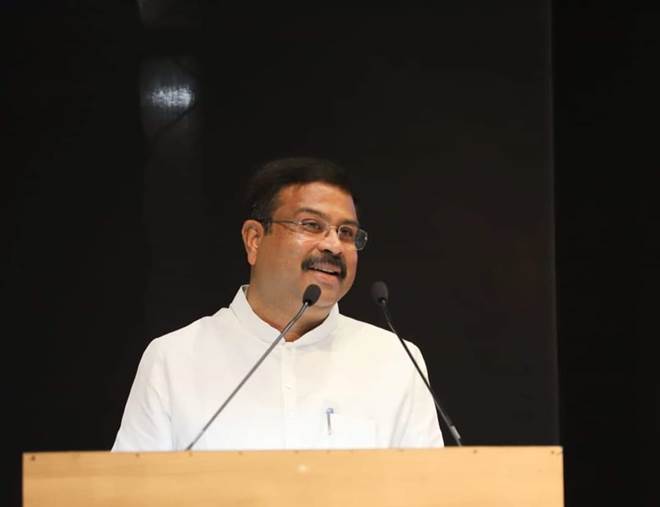
Democracy and Panchayati Raj system exist in Odisha from ancient times to the contemporary era, and the Odia culture and tradition promote importance of women empowerment, women participation and women leadership in the inclusive and all-round development of the society, State and Nation, remarked Shri Dharmendra Pradhan while addressing the large gathering of Panchayat representatives. He lauded the incredible contributions of the women in the remarkable journey of development in the country. Union Education Minister stressed the need to provide access to quality education for all in rural areas.
Speaking on the occasion, Union Minister of Education urged the heads of the Gram Panchayats to formulate plans to achieve Sustainable Development Goals by according due importance to the voice of the rural masses.
Union Minister of State for Panchayati Raj, Shri Kapil Moreshwar Patil called for concerted effort by all stakeholders to realize the sustainable development goals in Gram Panchayats. He stressed on the need to work in unison and join hands to fulfil the dream of our Prime Minister to develop the villages as envisioned by the Father of the Nation, Mahatma Gandhi. The Union Minister added that such workshops are organized with the aim of finding ways through discussion among stakeholders to meet the challenges we face while endeavouring towards achieving a shared goal.
Calling upon the heads of the Panchayats to take up the responsibility of the overall development of each Gram Panchayat, Shri Kapil Moreshwar Patil said they should aim high, set goals and yearn to achieve them in the best possible ways. Stressing the importance of proper utilization of the resources and funds available with Gram Panchayats, Shri Kapil Patil called for localization of SDGs and its time-bound attainment in thematic areas.
Urging the participants from various States /UTs to learn from the best practices being shared and discussed during three-day National Workshop, the Union Minister of State for Panchayati Raj pinpointed the need in implementing those in their respective States/ UTs.
Shri Kapil Moreshwar Patil, Union MoS for Panchayati Raj said that elected representatives of PRIs play a key role to achieve the goals of SDGs at the grassroots level as they are real executors of schemes and programmes of the Government. Development of the country mainly depends on the empowerment of the villages, he added.
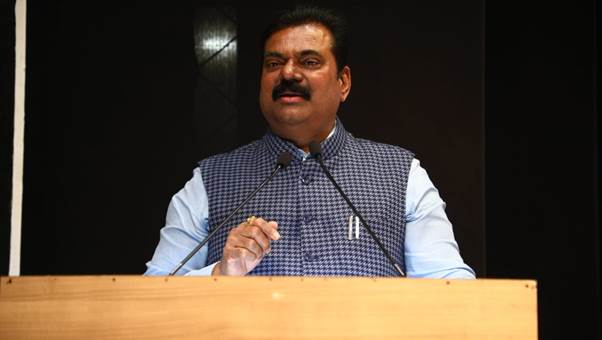
Shri Pradip Kumar Amat, Minister of Panchayati Raj & Drinking Water, Forest & Environment & Climate Change and Information and Public Relations, Government of Odisha stated that the legendary Biju Patnaik had taken a historical step for the empowerment of women in Odisha by reserving 33% seats for women in the Panchayati Raj institutes and Urban Local bodies. Further, the Chief Minister Shri Naveen Patnaik enhanced the reservation to 50%, which has revolutionised the empowerment of women in the State. Further, through Mission Shakti lakhs of women in the State are being economically empowered, setting an example for other States in the country.
Speaking on the occasion, Smt. Basanti Hembram, Minister of State (Independent Charge) for Women & Child Development and Mission Shakti, Government of Odisha said that PRI representatives, government officials and general public are the three key stakeholders of LSDGs at grass roots level and interpersonal cooperation and coordination in between them is highly required for successful implementation of the LSDGs by 2030.
Shri Suresh Chandra Mohapatra, Chief Secretary, Government of Odisha noted that Odisha is one of the pioneer states in the country in women empowerment and development. Fund is not a constraint for development of ‘Child and Women Friendly Panchayats’. He also said that reflecting the positive trend, while there is 50% reservation for women in the Panchayats in Odisha, but Women make up 56℅ of the total Sarpanches in the state.
At the outset, Shri Sushil Kumar Lohani, Principal Secretary, Panchayati Raj & Drinking Water Department, Government of Odisha welcomed the dignitaries, delegates, PRI representatives and domain experts from across the country to this National Workshop and elaborated about the importance of LSDGs in Gram Panchayats.
Dr. Chandra Shekhar Kumar, Additional Secretary, Ministry of Panchayati Raj, Government of India emphasized on the importance of proper convergence and synergy between Centre and States to localize and achieve the SDGs by 2030.
Ms. Cynthia McCaffrey Representative, UNICEF, India Country Office praised the Central and State Government for taking adequate steps on women empowerment and child development.
The three-day National Workshop on Localization of Sustainable Development Goals (LSDGs) in Panchayats through Adopting Thematic Approaches on Theme 3: Child Friendly Village and Theme 9: Women Friendly Village, was inaugurated by Shri Pradhan and Shri Kapil Patil.
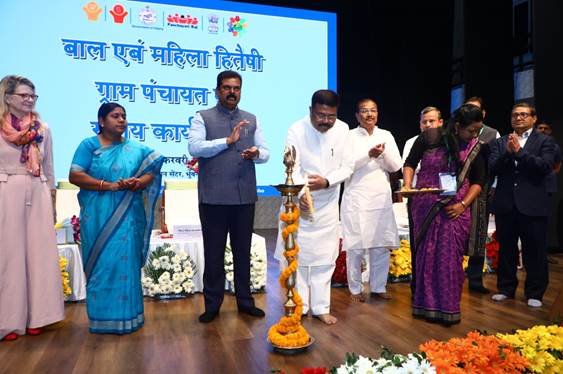
A host of Senior Officers of the Government of India and State Governments, representatives of United Nations / international agencies are participating in the National Workshop. Around 1500 elected representatives and functionaries of Panchayati Raj Institutions from across the country and across the State of Odisha are participating in the National Workshop. Panchayats that have taken initiatives in thematic areas – women friendly and child friendly – have been invited for participation in the Workshop. Participants also consist of elected representatives & functionaries of Panchayats, key stakeholders, domain experts and agencies doing exemplary work for empowerment and protection of women and children, and ensuring their wholesome development. Representatives of all States/ UTs from State Department of Panchayati Raj & Rural Development, Women and Child Development and other line Departments, NIRD&PR, SIRD&PRs, Panchayati Raj Training Institutes, UN agencies, NGOs, SHGs, are also participating in the National Workshop.
‘Odisha State Roadmap on SDG localisation in Panchayats’ – State Roadmap on LSDGs by State of Odisha was released during the inaugural session of the National Workshop. Apart from release of Roadmap for LSDGs through PRIs in Odisha, Vision Document on Theme 3 & Theme 9 (Child & Women Friendly Panchayat), Coffee Table Book on Empowering Rural Communities creating opportunities through Panchayati Raj Institutions and LSDGs Leaflets were also released at the hands of dignitaries in digital as well as physical form. Compendium of Good Practices on Child Friendly Local Governance prepared by UNICEF India was also released on this occasion.
After inaugural session, two panel discussions were also held on this first day of the event. The first panel discussion on “Child Friendly Village: Safe and Protected Environment for Children and equitable access to all essential social services” was chaired by Smt. Shubha Sarma, Commissioner-cum-Secretary, Department of Women & Child Development, Government of Odisha. Second panel discussion was held on the topic Women Friendly Village chaired by Smt. Guha Poonam Tapas Kumar, CEO, ORMAS, PR&DW, Government of Odisha.
Among others, experts from the line Ministries / Departments, NGOs, Domain Experts and GPs also joined the respective panel discussions. Many inspiring short and documentary movies relating to the theme i.e. Child and Women Friendly Panchayat of LSDGs were also showcased by different States and domain experts.
Live web-streaming of the National Workshop has been made available across social media platforms of the Ministry of Panchayati Raj to ensure maximizing virtual participation of elected representatives and functionaries of Panchayati Raj Institutions.
Background:
Sustainable Development Goals adopted by United Nations came into effect from January 1, 2016. Ministry of Panchayat Raj, Government of India has adopted thematic approach to SDGs – It is approach to ensure ‘local action’ for achieving ‘global plan’. The approach aims to localise SDGs in rural areas through PRIs, especially Gram Panchayats by clubbing 17 ‘Goals’ into ‘9 Themes’. Appropriate policy decisions and revisions have followed resulting into revamping of Rashtriya Gram Swaraj Abhiyan (RGSA) and Gram Panchayat Development Plan (GPDP) Guidelines which smoothens the process of Localisation of Sustainable Development Goals (LSDGs) in Gram Panchayats.
In pursuance to the agenda of localising Sustainable Development Goals in Panchayats, Ministry of Panchayat Raj, Government of India is organising a series of Thematic Workshops/ Conferences on Localization of Sustainable Development Goals (LSDGs) based on the nine themes to be saturated by the Panchayati Raj Institutions (PRIs), at different locations in close collaboration with State/ UT Departments of Panchayati Raj, State Institutes of Rural Development & Panchayati Raj (SIRD&PRs), line Ministries/ Departments and other stakeholders. The effective and impactful implementation of LSDGs can occur only when the concept and its process are properly understood, imbibed and implemented by the three-tier Panchayati Raj Institutions (PRIs) in order to ensure no one is left behind.
Vision of LSDGs Theme 3 – Child Friendly Village is to ensure that all the children are able to enjoy their rights for survival, development, participation and protection. The Gram Panchayats needs to provide safe, secure and clean environment to all children wherein each child can develop to their full potential by ensuring the basic requirements in terms of Health, Education, Nutrition and Protected environment for wellbeing of each child.
Vision of LSDGs Theme 9 – Women Friendly Village is to achieve gender equality, provide equal opportunity, Equal rights, empowerment opportunities and safe and secured environment for the wellbeing of women. Apart from this appropriate facilities of Health, Education, Nutrition. the theme, it is aimed to reduce crimes, ensuring safe public and private spheres, improving women’s participation in decision-making process for sustainable development, and equal pay for equal work, etc. for women at the grassroots.
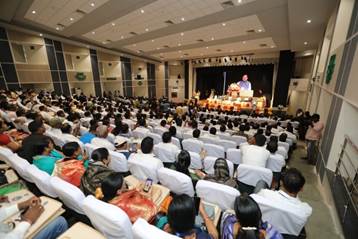
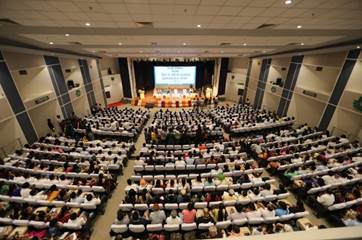
*****
SNC/PK/MS